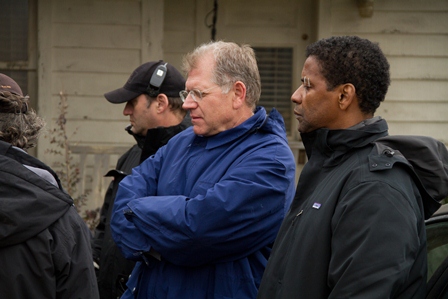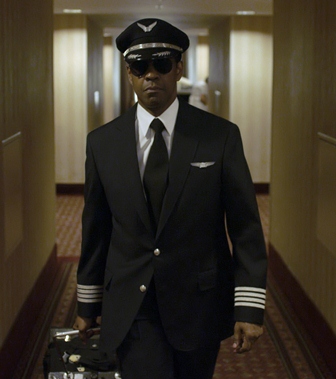CHICAGO – Patrick McDonald of HollywoodChicago.com audio review for the doc series “Charlie Hustle & the Matter of Pete Rose,” about the rise and bitter fall of the major league legend, the MLB’s all-time hits leader, only to be banned from the sport because of gambling. Streaming on MAX and on HBO since July 24th.
Interview: Director Robert Zemeckis Explains Reasons For ‘Flight’
CHICAGO – Oscar-winning director Robert Zemeckis (“Back to the Future,” “Forrest Gump”) returns to live-action for the first time since “Cast Away” this week with the spectacular “Flight,” starring Denzel Washington, Don Cheadle, Kelly Reilly, and Bruce Greenwood. The multi-talented filmmaker sat down with us last week to talk about what motivated him to make the film, what drives art in general, and even the future of “Who Framed Roger Rabbit 2?”
HOLLYWOODCHICAGO.COM: I was speaking with a friend after the movie and he was using words like “vulnerability,” “responsibility,” and issues of theme instead of plot. Is that something you consider when you’re making a movie - what does this say about mankind?
ROBERT ZEMECKIS: I could be real lofty and say “Isn’t that what all art is supposed to do?” Isn’t it supposed to simplify all of these human issues? Isn’t that the whole point of it? Isn’t that what music is supposed to do? Poetry? The way I would answer that question is that I look for a character that arcs and that arc, if it’s well-written, generally, speaks to something that most people in the audience can identify with. And then it becomes all of those words that you suggest. It’s all rooted in the character’s journey. We can identify with not the specific incidents but we say, “Oh, yeah. It’s evoking a feeling in me.”

Robert Zemeckis
Photo credit: Joe Arce/Starstruck Foto
HOLLYWOODCHICAGO.COM: When you’re picking a project do you think about how it plays into things that perhaps you’ve said already through your art? Either themes you want to hit again or purposefully not repeat?
ZEMECKIS: No. It would have to be a really, really, really, really powerful and great screenplay for me to do something about someone who abuses substances next. But if it was really, really, really great, I’d do it.
HOLLYWOODCHICAGO.COM: It’s the power of the work more than your history?
ZEMECKIS: Yeah. I’m sure you’ll get to this question so I’ll answer it ahead of time - you’re gonna ask me what I’m gonna do next. And I don’t know. And I never have. It’s not conventional wisdom in Hollywood but I’m very concerned about reacting to what I just did. And that would be a reaction. I like to put some space to give myself some decompression time.
 Robert Zemeckis Photo credit: Paramount |
HOLLYWOODCHICAGO.COM: Reacting as in too distinctly trying to do something different?
ZEMECKIS: Yeah. And it could be really subconscious. I think you have to guard against that.
HOLLYWOODCHICAGO.COM: How did the motion-capture work make you a different live-action director?
ZEMECKIS: That’s a good question because it was on a LOT of levels. The one that no one seems to understand is it made me a great actor’s director because when you’re working with motion capture, you’re doing black box theatre. I haven’t done that since I was doing theatre workshops in college. It’s no props. A couple of chairs. And you’re just doing scenes from beginning to end. And you’re just working with the cast. So that’s number one. So when I stepped into this movie with this magnificent cast, I was in shape.
HOLLYWOODCHICAGO.COM: More so than you think you were fifteen years ago?
ZEMECKIS: Look at the gunslinger roster of actors I worked with in the performance capture. It’s magnificent. Really great people. And I think the thing that I might have learned was I realized the power of allowing the actors to set the rhythm of the scene. And then when you work with someone like Denzel, that became the gold standard. Generally, a director comes in with control. When you’re in theater, it’s the actors who are in control of the rhythms. I found when I was editing, I had to edit on Denzel’s rhythm. And, of course, I was able to do the movie for very little money - $31 million - because I had all of these great artists who I knew could just step in and do it so efficiently.
 Flight Photo credit: Paramount |
HOLLYWOODCHICAGO.COM: Wow. That’s an amazing budget.
ZEMECKIS: I’ll send you the top-sheet if you don’t believe me. It’s not bullshit. I’m happy to do it. (Laughs.) That’s from having all that CG experience to go in and make this movie look like this because I had so much talent at my disposal.
HOLLYWOODCHICAGO.COM: At one point during the film I thought to myself, “I don’t know if I like this guy. Or if I’m supposed to.” Did you worry about making your protagonist TOO unlikable?
ZEMECKIS: That was in the script. And Denzel GOT that. And, of course, he’s a filmmaker too. He knew that we were all on this tightrope. He knew what we had to do here. When you read the script, you had that feeling.
HOLLYWOODCHICAGO.COM: Is that what attracted you to the script?
ZEMECKIS: Absolutely. Everything is filled with moral ambiguity. Every scene. Every character. You don’t know whether you like ‘em or not. I guess the Kelly Reilly character doesn’t have…she just wants to be clean. Cheadle. Goodman — he’s horrific but you love him. What I wanted to evoke was this thing where the audience is continually resetting its moral compass. How do I feel about this? That’s really what the question is - it’s not if you like him but you’re questioning your own morality.
HOLLYWOODCHICAGO.COM: You’ve made so many influential films. When you’re making something like “Back to the Future” or “Roger Rabbit,” do you know you’re making an “important movie” or is that only after the fact?
ZEMECKIS: It’s only after the fact. When you’re making a movie, you’re just surviving. You’re hoping to get through the day without getting fired. You’re hoping to survive. That’s what I feel for “Flight” as well — I hope the movie make $1 profit so nobody gets hurt. That’s really it. I ask my crew that too. I ask them. I ask if they know if a movie is gonna be good. They go, “Never.” That’s what they say anyway. Isn’t that interesting?
 Robert Zemeckis Photo credit: Paramount |
HOLLYWOODCHICAGO.COM: It is. I wonder if that’s relative across all art. Did The Beatles know what they were doing? Or were they just making music?
ZEMECKIS: It would wreck the whole thing. It would become product. There’s “The Magic of the Movies,” which is basically what you’re talking about because of corporate America knew how to make every movie a great movie then all movies would look exactly alike…which they kinda do now anyway. (Laughs.)
HOLLYWOODCHICAGO.COM: I love that this is an original screenplay. I told my wife the plot and her first response was, “It’s based on a book, right?” We’re so used to seeing characters this complex come from fiction more often.
ZEMECKIS: Which is telling. It’s a system that’s designed to not allow that but you can do that in novel writing.
HOLLYWOODCHICAGO.COM: There was a book written a couple of years ago called “The Movie That Changed My Life.” What’s yours?
ZEMECKIS: I remember very distinctly seeing “Bonnie and Clyde” for the first time. I was a Freshman in high school. All of my friends were talking about the machine-gunning scene at the end and I went and I remember being emotionally moved when these characters started dying. I remember feeling horrible when Gene Hackman got shot in the head. And I remember thinking, “Wow. There’s this thing that I’m feeling and I want to find out what that is.” I fell in love with the art form and started to learn that movies were more than action and effects. There was a director who did this. So that was sort of it.
HOLLYWOODCHICAGO.COM: When I was a 14-year-old boy, I had a “Who Framed Roger Rabbit?” poster on my wall and so I have to ask - Are we ever going to re-visit that world?
ZEMECKIS: Yeah, ya know, we might. I don’t know. But I’ve got two bits of good news and then one bit of bad news. The bad news is that Bob Hoskins is retiring but we might be able to coax him out. We’ll see. The good news is that the executive turmoil at Disney is starting to calm down. They’re finally getting their act together. And, secondly, there’s a really good script sitting there. The original writers wrote it.
“Flight” stars Denzel Washington, Kelly Reilly, Bruce Greenwood, Don Cheadle, and John Goodman. It opens on Friday, November 2, 2012. Come back tomorrow for our full review.
 | By BRIAN TALLERICO |


